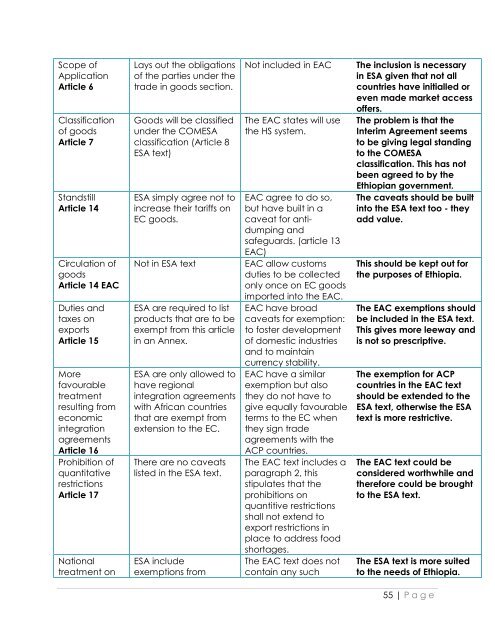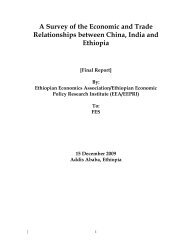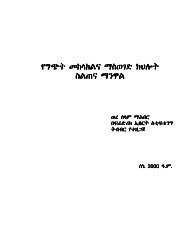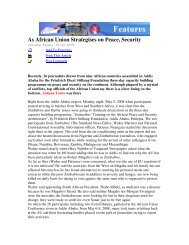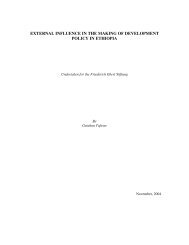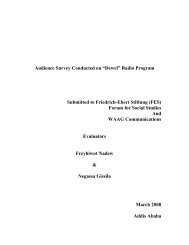Ethiopia and EPA Negotiation 2008 - FES Ethiopia
Ethiopia and EPA Negotiation 2008 - FES Ethiopia
Ethiopia and EPA Negotiation 2008 - FES Ethiopia
Create successful ePaper yourself
Turn your PDF publications into a flip-book with our unique Google optimized e-Paper software.
Scope of<br />
Application<br />
Article 6<br />
Classification<br />
of goods<br />
Article 7<br />
St<strong>and</strong>still<br />
Article 14<br />
Circulation of<br />
goods<br />
Article 14 EAC<br />
Duties <strong>and</strong><br />
taxes on<br />
exports<br />
Article 15<br />
More<br />
favourable<br />
treatment<br />
resulting from<br />
economic<br />
integration<br />
agreements<br />
Article 16<br />
Prohibition of<br />
quantitative<br />
restrictions<br />
Article 17<br />
National<br />
treatment on<br />
Lays out the obligations<br />
of the parties under the<br />
trade in goods section.<br />
Goods will be classified<br />
under the COMESA<br />
classification (Article 8<br />
ESA text)<br />
ESA simply agree not to<br />
increase their tariffs on<br />
EC goods.<br />
Not in ESA text<br />
ESA are required to list<br />
products that are to be<br />
exempt from this article<br />
in an Annex.<br />
ESA are only allowed to<br />
have regional<br />
integration agreements<br />
with African countries<br />
that are exempt from<br />
extension to the EC.<br />
There are no caveats<br />
listed in the ESA text.<br />
ESA include<br />
exemptions from<br />
Not included in EAC<br />
The EAC states will use<br />
the HS system.<br />
EAC agree to do so,<br />
but have built in a<br />
caveat for antidumping<br />
<strong>and</strong><br />
safeguards. (article 13<br />
EAC)<br />
EAC allow customs<br />
duties to be collected<br />
only once on EC goods<br />
imported into the EAC.<br />
EAC have broad<br />
caveats for exemption:<br />
to foster development<br />
of domestic industries<br />
<strong>and</strong> to maintain<br />
currency stability.<br />
EAC have a similar<br />
exemption but also<br />
they do not have to<br />
give equally favourable<br />
terms to the EC when<br />
they sign trade<br />
agreements with the<br />
ACP countries.<br />
The EAC text includes a<br />
paragraph 2, this<br />
stipulates that the<br />
prohibitions on<br />
quantitive restrictions<br />
shall not extend to<br />
export restrictions in<br />
place to address food<br />
shortages.<br />
The EAC text does not<br />
contain any such<br />
The inclusion is necessary<br />
in ESA given that not all<br />
countries have initialled or<br />
even made market access<br />
offers.<br />
The problem is that the<br />
Interim Agreement seems<br />
to be giving legal st<strong>and</strong>ing<br />
to the COMESA<br />
classification. This has not<br />
been agreed to by the<br />
<strong>Ethiopia</strong>n government.<br />
The caveats should be built<br />
into the ESA text too - they<br />
add value.<br />
This should be kept out for<br />
the purposes of <strong>Ethiopia</strong>.<br />
The EAC exemptions should<br />
be included in the ESA text.<br />
This gives more leeway <strong>and</strong><br />
is not so prescriptive.<br />
The exemption for ACP<br />
countries in the EAC text<br />
should be extended to the<br />
ESA text, otherwise the ESA<br />
text is more restrictive.<br />
The EAC text could be<br />
considered worthwhile <strong>and</strong><br />
therefore could be brought<br />
to the ESA text.<br />
The ESA text is more suited<br />
to the needs of <strong>Ethiopia</strong>.<br />
55 | P a g e


